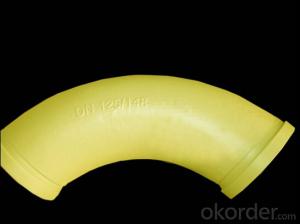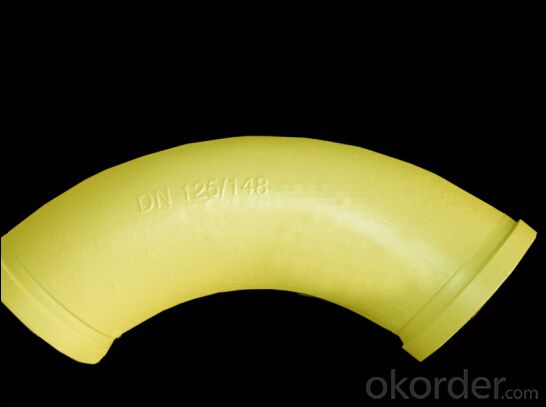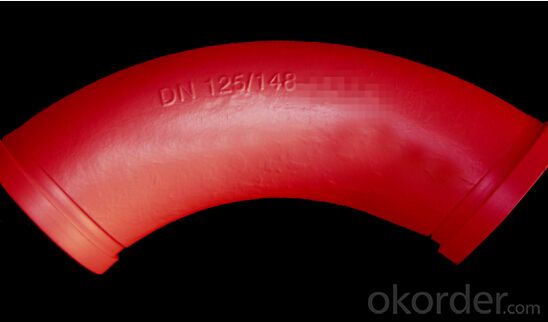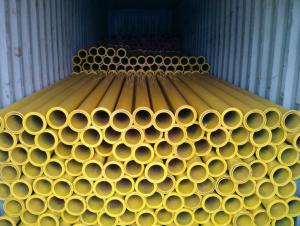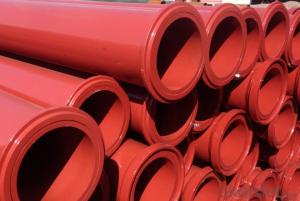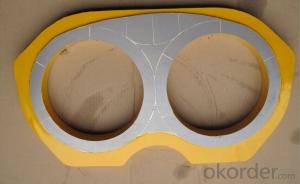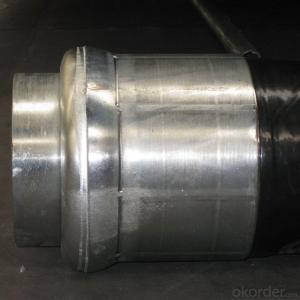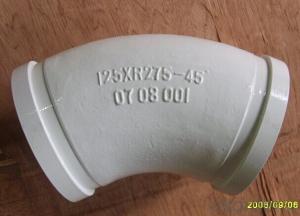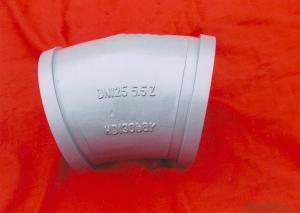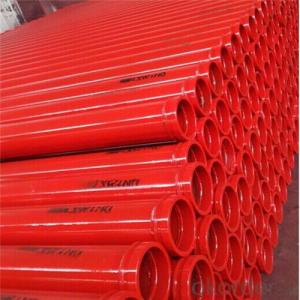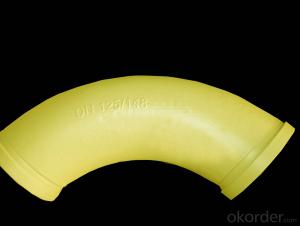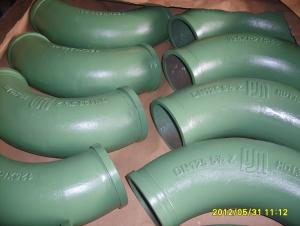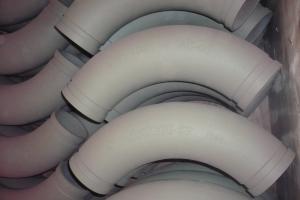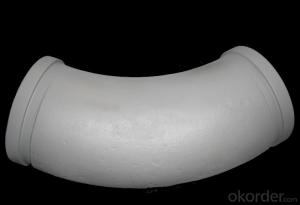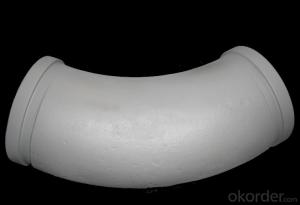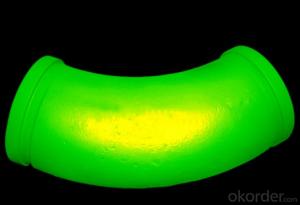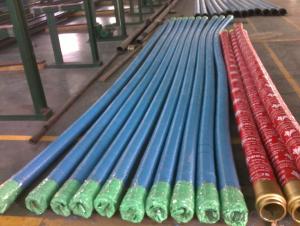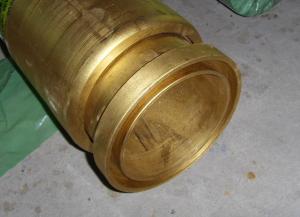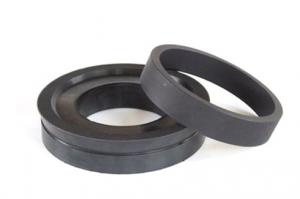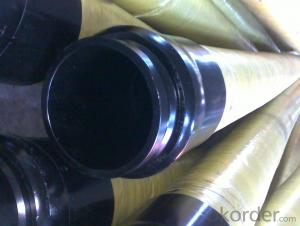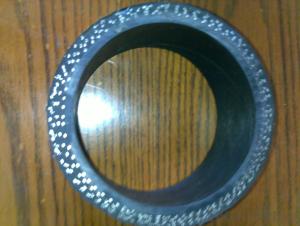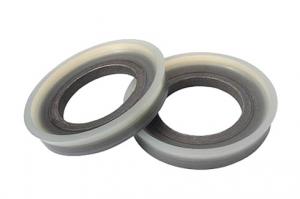Concrete Pump Elbow R275, 90DGR AC Red with High Quality
- Loading Port:
- Tianjin
- Payment Terms:
- TT or LC
- Min Order Qty:
- 10 pc
- Supply Capability:
- 5000 pc/month
OKorder Service Pledge
OKorder Financial Service
You Might Also Like
Product Name: Concrete Pump ELBOW R275, 90DGR AC RED
1. Specification
Dimensions: DN125MM
Radius: 275mm,1000mm
Flange: SK, ZX, F&M
Degree: 30°, 45°, 90°
Material: #20 steel, ST52, Mn 13-4
Thickness: 4.5mm,6mm,7.1mm,7.5mm,10mm,
Working pressure: 180MPa
Notes: total series of Concrete Pump ELBOW R275, 90DGR AC for different brand concrete pump(PUTZMEISTER, SCHWING, CIFA, SANY, ZOOMLION, IHI, KYOKUTO Etc) available from us.
2. Application
Concrete Pump ELBOW R275, 90DGR AC widely used on concrete pump truck, concrete placing boom, trailer concrete pump etc, for concrete delivery pipe connection.
Our concrete pump bends have been successfully exported to many countries from 1998, Our main markets as below: Middle East, Southeast Asia, America, Brazil, Italy, Russia, South Africa etc
Aiming at the largest concrete pump parts manufacturer, and reliable, professional supplier in China, we can supply concrete pump elbows, delivery pipes, casting or forging couplings, end rubber hoses, rubber pistons, tungsten wear plates, delivery cylinders, and other hydraulic parts, one stop service for your concrete pump parts and accessory business.
3. Package
Every 60pcs Concrete Pump ELBOW R275, 90DGR AC put in one seaworthy wooden box, and 20 boxes in one 20feet container.
FAQ:
Q1: Why buy Materials & Equipment from OKorder.com?
A1: All products have its ISO certifications, adheres to the highest standards and a commitment to supply chain safety and customer satisfaction.
Q2: How do we guarantee the quality of our products?
A2: We have established an advanced quality management system which conducts strict quality tests at every step, from raw materials to the final product. At the same time, we provide extensive follow-up service assurances as required.
Q3: How soon can we receive the product after purchase?
A3: Within three days of placing an order, we will begin production. The specific shipping date is dependent upon international and government factors, but is typically 10 to 30 workdays.
Q4: If we can produce some Concrete Pump ELBOW R275, 90DGR AC according to customers request?
A4: Yes, we can produce Concrete Pump ELBOW R275, 90DGR AC according to the difference country situations and different concrete pump to make it suitable to the market and customers. We have very professional technical team to make the design.
Q5: How to make a quick resolution for after service?
A5:We have overseas branches all-around of world, IF needed, the seller shall dispatch 2 engineers to the buyer's site for supervision of training. The buyer shall make available of necessary facilities &skilled personnel at site for training.
Images:
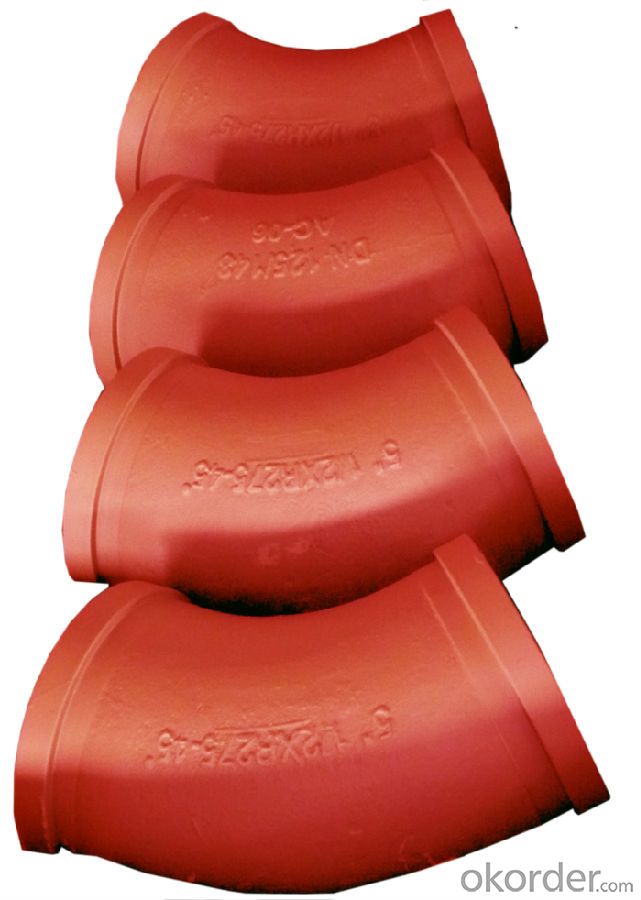
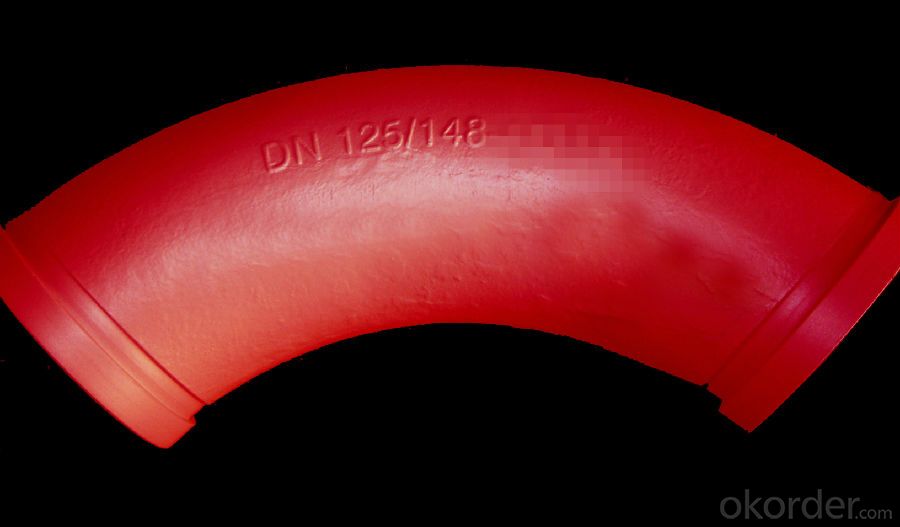
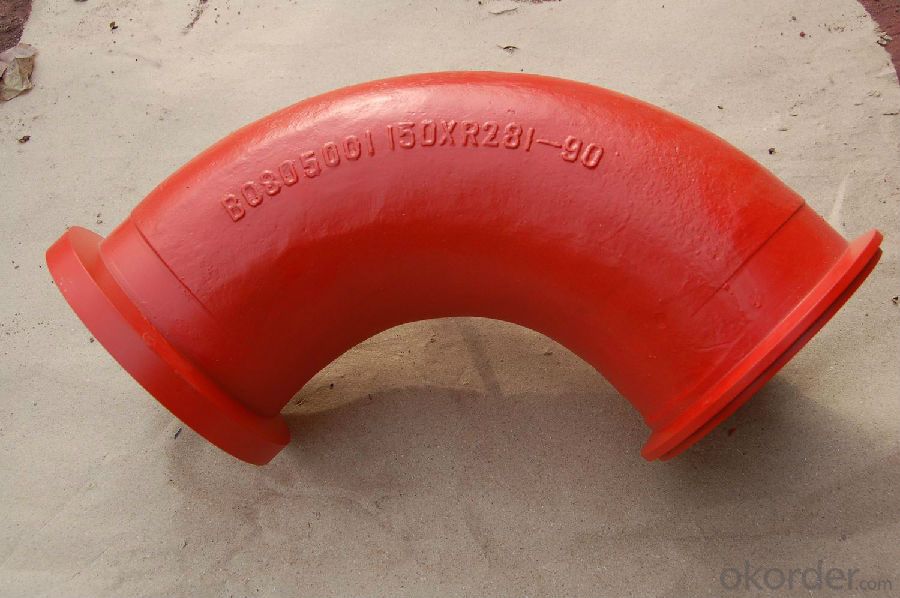
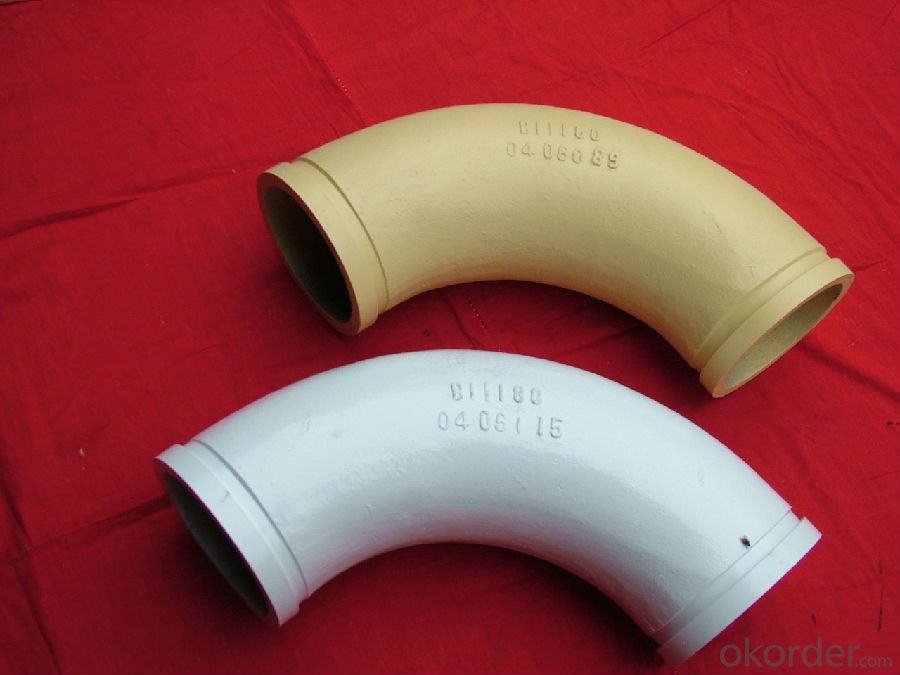
- Q: What are the layout requirements of concrete pump for building engineering?
- Concrete pump or pump truck layout, parking site should have enough space, in order to ensure concrete mixing truck feeding, shunting convenience
- Q: How often should concrete pump control valves be inspected and replaced?
- Regular inspections should be conducted on concrete pump control valves to ensure their proper and safe functioning. The frequency of these inspections will vary depending on the specific conditions and usage of the pump. Generally, it is advised to inspect the control valves at least once every three to six months. However, if the pump is extensively used or operates in harsh conditions, more frequent inspections may be necessary. The decision to replace control valves should be made based on the inspection results and the recommendations of the manufacturer or a qualified professional. If the control valves display signs of wear, damage, or malfunction, immediate replacement is necessary to prevent any potential safety hazards or disruptions in the pump's operation. Timely replacement and regular maintenance of control valves are essential to ensure the concrete pump operates efficiently and safely.
- Q: How can a faulty boom affect the concrete placement process?
- A faulty boom can significantly affect the concrete placement process. It can lead to uneven distribution of concrete, resulting in inconsistent concrete strength and quality. It may also cause the concrete to be placed in unintended areas or at incorrect heights, affecting the overall structural integrity of the project. Additionally, a faulty boom can pose a safety risk to workers and equipment involved in the concrete placement process.
- Q: How does a concrete pump S valve function?
- Controlling the flow of concrete from the hopper to the discharge outlet is the primary function of the S valve in a concrete pump. This valve is a critical component in the concrete pumping system, enabling the accurate and efficient delivery of concrete to the intended destination. The S valve comprises two distinct valves, one on each side, connected by a central shaft. These valves are shaped like the letter "S," hence the name. Each valve possesses a concrete outlet and a hydraulic cylinder that governs its movement. When the concrete pump is activated, the hydraulic system exerts pressure on the cylinders, causing them to extend and open the valves. This opening enables the flow of concrete from the hopper into the pump's cylinder. Once the concrete enters the cylinder, the hydraulic system reverses the pressure on the cylinders, prompting them to retract. This retraction movement closes the valves, effectively sealing the cylinder and preventing any concrete from flowing backward. As the cylinder retracts, it propels the concrete towards the discharge outlet. The pressure generated by the cylinder's retraction forces the concrete through the outlet pipe, directing it to the desired pouring location. The ingenious design of the S valve ensures a seamless and uninterrupted flow of concrete, eliminating any potential interruptions or obstructions. Moreover, it grants operators a high level of control over the concrete placement, enabling them to adjust the flow rate and direction according to their requirements. In conclusion, the concrete pump S valve assumes the crucial role of regulating the concrete flow, guaranteeing its efficient and precise delivery to the intended destination. Its dependable and effective operation is indispensable for the success of concrete pumping operations.
- Q: How do I find the right part number for a specific concrete pump spare part?
- To find the right part number for a specific concrete pump spare part, you can follow these steps: 1. Start by identifying the make and model of your concrete pump. This information is usually found on the pump itself or in the product documentation. 2. Once you have the make and model, visit the manufacturer's website or contact their customer support directly. They will typically have a parts catalog or database where you can search for the specific part you need. 3. Use the provided search tool or browse through the catalog to find the section related to your concrete pump model. Look for the parts that match your description or function. 4. Pay attention to the part numbers listed alongside the descriptions. These numbers are usually unique identifiers for each specific part. Make note of the part number(s) that match the spare part you require. 5. If you are unable to find the required part number on the manufacturer's website or catalog, consider reaching out to authorized dealers or distributors of the concrete pump brand. They may have additional resources or access to parts that are not readily available elsewhere. By following these steps and utilizing the manufacturer's resources, you should be able to find the right part number for your specific concrete pump spare part.
- Q: How much is the pump for a month?
- Remove the pump car monthly fuel maintenance consumption (about 10 thousand to 5000), calculate the monthly one of the clay, probably earn about 14 to 150 thousand net!
- Q: Are there any specific warranty options available for concrete pump spare parts?
- Yes, there are specific warranty options available for concrete pump spare parts. Many manufacturers and suppliers offer warranties on their products to provide customers with peace of mind and assurance of quality. The specific warranty options may vary depending on the manufacturer or supplier, but they generally cover defects in materials or workmanship. It is recommended to carefully review the warranty terms and conditions before purchasing concrete pump spare parts to understand what is covered and for how long. Some warranties may provide a limited duration of coverage, while others may offer extended warranties for an additional cost. Additionally, it is important to follow the recommended maintenance and usage guidelines to ensure the warranty remains valid. In case of any issues or concerns with the spare parts during the warranty period, customers can typically contact the manufacturer or supplier for assistance.
- Q: How often should concrete pump clamps be inspected and replaced?
- Concrete pump clamps should be inspected on a regular basis to ensure they are functioning properly and to identify any signs of wear or damage. The frequency of inspections will depend on various factors such as the frequency of use, the type of concrete being pumped, and the working conditions. In general, it is recommended to inspect concrete pump clamps at least once a month or after every 100 hours of operation, whichever comes first. This will help catch any potential issues early on and prevent them from escalating into major problems. Additionally, it is important to visually inspect the clamps before each use to check for any visible signs of damage or wear. This includes checking for cracks, deformations, or any loose or missing bolts. The lifespan of concrete pump clamps will vary depending on the quality of the clamps, the intensity of use, and the maintenance practices. However, as a general guideline, it is recommended to replace the clamps every 1-2 years or sooner if they show significant signs of wear or damage. Regular inspections and timely replacements of concrete pump clamps are vital to ensure the safety and efficiency of the pumping operations. It is always better to be proactive and address any potential issues promptly to prevent costly repairs or accidents.
- Q: How can I determine if the concrete pump cylinder needs replacement?
- To determine if the concrete pump cylinder needs replacement, you should inspect it for any visible signs of wear or damage. Look for cracks, leaks, or excessive corrosion on the cylinder. Additionally, monitor the pump's performance and check if there are any irregularities or issues during operation, such as decreased pumping efficiency or increased noise. It is also recommended to consult with a professional concrete pump technician or manufacturer for a thorough inspection and assessment of the cylinder's condition.
- Q: How do concrete pump spare parts contribute to the overall performance of the pump?
- Concrete pump spare parts play a crucial role in maintaining the overall performance of the pump. These spare parts, such as pipes, hoses, valves, and wear plates, ensure the smooth functioning of the pump by minimizing downtime and improving efficiency. They help in maintaining a consistent flow of concrete, preventing clogs and leaks, and enhancing the accuracy of the pumping process. Regular maintenance and replacement of these spare parts not only extend the lifespan of the pump but also contribute to its reliable and optimal performance, ultimately leading to increased productivity and customer satisfaction.
Send your message to us
Concrete Pump Elbow R275, 90DGR AC Red with High Quality
- Loading Port:
- Tianjin
- Payment Terms:
- TT or LC
- Min Order Qty:
- 10 pc
- Supply Capability:
- 5000 pc/month
OKorder Service Pledge
OKorder Financial Service
Similar products
Hot products
Hot Searches
Related keywords
